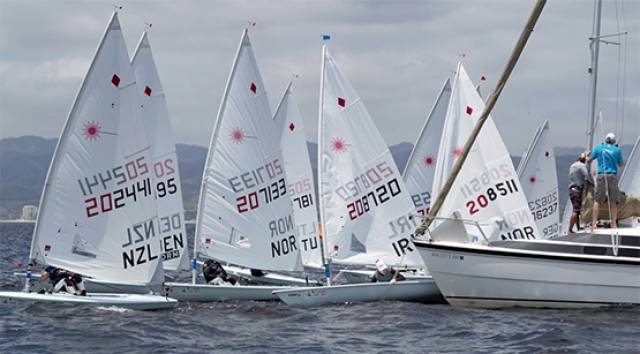Both Annalise Murphy and Aoife Hopkins will complete the 71–boat Women's Laser Radial World Championship in the Silver fleet following the conclusion of the fourth and final day of qualifying races in difficult conditions yesterday. The Irish Olympic class trialists finished 40th and 46th respectively missing the top 35 cut for Gold fleet participation. The final rounds begin today and run over the remaining three days of competition on Banderas Bay, Mexico.
Looking very much like an Olympic regatta dress rehearsal, currently the top 12 places are filled by 12 different countries with some familiar names at the top of the star–studded fleet. First is Marit Bouwmeester (NED), second Paige Railey (USA) and third Alison Young (GBR). The Olympic Gold Medallist Lijia Xu (CHN) is tenth overall.
Yesterday, the starting sequence for the first race (R7 for Yellow) began at 1400h, but a shift to the right led to a postponement. After settling in at about 10 knots from WSW, this fleet started cleanly, but a general recall for the Blue Fleet gave time for the wind to shift back to the left. The Race committee adjusted the course and the Blue Fleet started under a black flag restriction in 12-14 knots of building breeze and clearing skies.
| 1st | 206333 | Marit Bouwmeester |  NED NED |
(17.0) | 1.0 | 1.0 | 1.0 | 1.0 | 3.0 | 2.0 | 26.0 | 9.0 |
| 2nd | 197111 | Paige Railey |  USA USA |
(9.0) | 3.0 | 4.0 | 3.0 | 1.0 | 1.0 | 7.0 | 28.0 | 19.0 |
| 3rd | 202411 | Alison Young |  GBR GBR |
(11.0) | 1.0 | 7.0 | 6.0 | 2.0 | 4.0 | 3.0 | 34.0 | 23.0 |
| 4th | 184454 | Erika Reineke |  USA USA |
3.0 | 2.0 | 3.0 | 3.0 | 7.0 | (37.0 BFD) | 5.0 | 60.0 | 23.0 |
| 5th | 202750 | Gintare Volungeviciute Scheidt |  LTU LTU |
8.0 | 2.0 | 4.0 | 2.0 | 6.0 | (9.0) | 2.0 | 33.0 | 24.0 |
| 6th | 207194 | Anne-Marie Rindom |  DEN DEN |
(27.0) | 6.0 | 3.0 | 5.0 | 4.0 | 2.0 | 8.0 | 55.0 | 28.0 |
| 7th | 199066 | Manami Doi |  JPN JPN |
(13.0) | 10.0 | 5.0 | 11.0 | 4.0 | 4.0 | 1.0 | 48.0 | 35.0 |
| 8th | 204468 | Brenda Bowskill |  CAN CAN |
8.0 | (25.0) | 9.0 | 10.0 | 2.0 | 2.0 | 4.0 | 60.0 | 35.0 |
| 9th | 205491 | Luca Falasca |  ARG ARG |
4.0 | 12.0 | 2.0 | 7.0 | 11.0 | 1.0 | (21.0) | 58.0 | 37.0 |
| 10th | 177117 | Lijia Xu |  CHN CHN |
1.0 | 8.0 | (19.0) | 4.0 | 7.0 | 17.0 | 1.0 | 57.0 | 38.0 |
| 11th | 204452 | Dolores Moreira Fraschini |  URU URU |
2.0 | 15.0 | 10.0 | 2.0 | 14.0 | 3.0 | (19.0) | 65.0 | 46.0 |
| 12th | 202441 | Sara Winther |
Full results here






























































